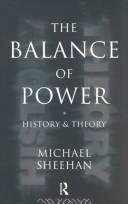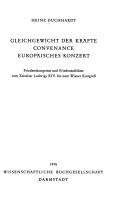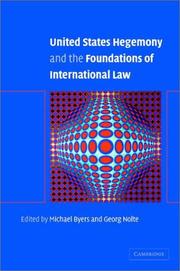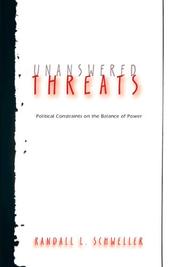| Listing 1 - 8 of 8 |
Sort by
|

ISBN: 0415119316 0415119308 9780415119313 Year: 1996 Publisher: London: Routledge,
Abstract | Keywords | Export | Availability | Bookmark
 Loading...
Loading...Choose an application
- Reference Manager
- EndNote
- RefWorks (Direct export to RefWorks)
International relations. Foreign policy --- Balance of power --- International relations --- Equilibre des puissances --- Relations internationales --- History --- Philosophy. --- Histoire --- Philosophie --- Philosophy --- #SBIB:327.5H00 --- #SBIB:327.6H00 --- #SBIB:AANKOOP --- Strategie en vredesonderzoek: algemeen --- Internationale en diplomatieke relaties: algemeen --- History. --- Balance of power - History. --- Power, Balance of --- Power politics --- Political realism --- Balance of power - History --- International relations - Philosophy
Book
ISBN: 9780415475471 9780415724265 9780203127209 9781136461033 9781136461071 9781136461088 0415724260 0415475473 020312720X Year: 2012 Publisher: London: Routledge,
Abstract | Keywords | Export | Availability | Bookmark
 Loading...
Loading...Choose an application
- Reference Manager
- EndNote
- RefWorks (Direct export to RefWorks)
International relations --- Balance of power --- History --- Communauté internationale --- Relations internationales --- Coopération internationale --- 21st century --- Communauté internationale. --- Relations internationales. --- Coopération internationale. --- International relations - History - 21st century --- Balance of power - History - 21st century
Book
ISBN: 9782738147233 2738147232 2738147232 9782738147233 Year: 2019 Publisher: Paris: Odile Jacob,
Abstract | Keywords | Export | Availability | Bookmark
 Loading...
Loading...Choose an application
- Reference Manager
- EndNote
- RefWorks (Direct export to RefWorks)
L’humiliation est devenue l’ordinaire des relations internationales. Rabaisser un État, le mettre sous tutelle, le tenir à l’écart des lieux de décision, stigmatiser ses dirigeants : autant de pratiques diplomatiques qui se sont banalisées au fil du temps. De quoi ces diplomaties de l’humiliation sont-elles révélatrices ? Les réactions des humiliés – de la conférence de Bandung en 1955 aux Printemps arabes – n’invitent-elles pas à une autre gouvernance ? Convoquant l’histoire et la sociologie politique, Bertrand Badie remonte aux sources de l’humiliation : les conquêtes occidentales du xixe siècle, la montée des revanchismes dans l’entre-deux-guerres, une décolonisation mal maîtrisée. Il montre que sa banalisation consacre l’émergence dramatique des opinions publiques et des sociétés sur la scène internationale, mais qu’elle trahit aussi l’inadaptation des vieilles puissances et de leurs diplomaties à un monde de plus en plus globalisé. Dès lors, il devient urgent de reconstruire un ordre international dans lequel les humiliés et leurs sociétés trouveront toute leur place. La montée des populismes et l’élection de Trump en 2016, le durcissement des gouvernements autoritaires d’Erdogan et de Poutine ou les provocations de la Corée du Nord confirment le rôle structurel de l’humiliation dans les relations internationales, avec cette inversion inquiétante : l’humilié d’hier devient aussi l’humiliateur d’aujourd’hui.
International relations - History - 20th century --- International relations - History - 21st century --- Balance of power - History - 20th century --- Diplomacy - History - 20th century --- Relations internationales --- Humiliation --- Équilibre des puissances --- Aspect psychologique. --- Aspect politique. --- International relations --- Balance of power --- Diplomacy

ISBN: 3534063988 9783534063987 Year: 1976 Volume: 56 Publisher: Darmstadt: Wissenschaftliche Buchgesellschaft,
Abstract | Keywords | Export | Availability | Bookmark
 Loading...
Loading...Choose an application
- Reference Manager
- EndNote
- RefWorks (Direct export to RefWorks)
Peace --- Peace treaties --- Balance of power --- Congresses --- History --- -Peace --- -Peace treaties --- -Treaties of peace --- Treaties --- Coexistence, Peaceful --- Peaceful coexistence --- International relations --- Disarmament --- Peace-building --- Security, International --- War --- Power, Balance of --- Power politics --- Political realism --- -History --- History. --- Treaties of peace --- Congresses&delete& --- Peace - Congresses - History --- Peace treaties - History --- Balance of power - History

ISBN: 0521819490 0521050863 110713580X 0511179057 0511061579 0511326033 0511055242 0511494157 1280430605 1139148796 0511070039 9780521819497 9780511061578 9780511179051 9780511494154 9780511070037 9780511055249 9780521050869 9781280430602 9781139148795 9780511326035 Year: 2003 Publisher: Cambridge : Cambridge university press,
Abstract | Keywords | Export | Availability | Bookmark
 Loading...
Loading...Choose an application
- Reference Manager
- EndNote
- RefWorks (Direct export to RefWorks)
Successive hegemonic powers have shaped the foundations of international law. This book examines whether the predominance of the United States is leading to foundational change in the international legal system. A range of leading scholars in international law and international relations consider six foundational areas that could be undergoing change, including international community, sovereign equality, the law governing the use of force, and compliance. The authors demonstrate that the effects of US predominance on the foundations of international law are real, but also intensely complex. This complexity is due, in part, to a multitude of actors exercising influential roles. And it is also due to the continued vitality and remaining functionality of the international legal system itself. This system limits the influence of individual states, while stretching and bending in response to the changing geopolitics of our time.
Balance of power --- -International law --- -Law of nations --- Nations, Law of --- Public international law --- Law --- Power, Balance of --- Power politics --- International relations --- Political realism --- History --- United States --- Foreign relations. --- International law --- History. --- Droit international --- Equilibre des puissances --- Histoire --- Etats-Unis --- Foreign relations --- Relations extérieures --- Law of nations --- General and Others --- International law - History. --- International law - United States - History. --- Balance of power - History.

ISBN: 1282964976 9786612964978 1400837855 9781400837854 9780691136462 0691136467 0691124256 9780691124254 0691124256 Year: 2006 Publisher: Princeton (N.J.): Princeton university press,
Abstract | Keywords | Export | Availability | Bookmark
 Loading...
Loading...Choose an application
- Reference Manager
- EndNote
- RefWorks (Direct export to RefWorks)
Why have states throughout history regularly underestimated dangers to their survival? Why have some states been able to mobilize their material resources effectively to balance against threats, while others have not been able to do so? The phenomenon of "underbalancing" is a common but woefully underexamined behavior in international politics. Underbalancing occurs when states fail to recognize dangerous threats, choose not to react to them, or respond in paltry and imprudent ways. It is a response that directly contradicts the core prediction of structural realism's balance-of-power theory--that states motivated to survive as autonomous entities are coherent actors that, when confronted by dangerous threats, act to restore the disrupted balance by creating alliances or increasing their military capabilities, or, in some cases, a combination of both. Consistent with the new wave of neoclassical realist research, Unanswered Threats offers a theory of underbalancing based on four domestic-level variables--elite consensus, elite cohesion, social cohesion, and regime/government vulnerability--that channel, mediate, and redirect policy responses to external pressures and incentives. The theory yields five causal schemes for underbalancing behavior, which are tested against the cases of interwar Britain and France, France from 1877 to 1913, and the War of the Triple Alliance (1864-1870) that pitted tiny Paraguay against Brazil, Argentina, and Uruguay. Randall Schweller concludes that those most likely to underbalance are incoherent, fragmented states whose elites are constrained by political considerations.
Balance of power --- Power, Balance of --- Power politics --- International relations --- Political realism --- History. --- #SBIB:327.6H00 --- #SBIB:93H3 --- History --- Internationale en diplomatieke relaties: algemeen --- Thematische geschiedenis --- Equilibre des puissances --- Histoire --- Balance of power - History --- Balance of power - Case studies --- Equilibre des puissances - Histoire --- Equilibre des puissances - Cas, Etudes de
Book
ISBN: 9782251381305 2251381309 Year: 2015 Publisher: Paris : Les Belles lettres,
Abstract | Keywords | Export | Availability | Bookmark
 Loading...
Loading...Choose an application
- Reference Manager
- EndNote
- RefWorks (Direct export to RefWorks)
Un panorama historique des évènements économiques et politiques dans le monde entre la Première Guerre mondiale et le début des années 1930 : ascension des Etats-Unis, crise de 1929, montée du fascisme, etc. ©Electre 2016
Economic history --- World War, 1914-1918 --- Histoire économique --- Première guerre mondiale --- Economic aspects --- Aspect économique --- Guerre mondiale (1914-1918) --- Relations internationales --- Paix --- Histoire économique --- Première guerre mondiale --- Aspect économique --- Paix. --- Communauté internationale --- World War, 1914-1918 - Social aspects --- World politics - 1919-1932 --- Balance of power - History - 20th century --- Economic history - 1918-1945 --- International relations - History - 20th century --- World War, 1914-1918 - Economic aspects --- World War, 1914-1918 - United States --- World War, 1914-1918 - Influence --- Traités de paix --- Économie politique et politique --- Reconstruction d'après-guerre (1re guerre mondiale) --- Wilson, Woodrow, - 1856-1924 --- Wilson, Woodrow, 1856-1924 --- World politics --- Balance of power --- International relations
Book
ISSN: 16106040 ISBN: 9783465043690 3465043693 Year: 2021 Volume: 320 Publisher: Frankfurt am Main: Vittorio Klostermann,
Abstract | Keywords | Export | Availability | Bookmark
 Loading...
Loading...Choose an application
- Reference Manager
- EndNote
- RefWorks (Direct export to RefWorks)
Der Begriff "Staat" in seinem modernen Verstandnis wurde im deutschsprachigen Reich nicht mit Bezug auf das fruhneuzeitliche Alte Reich als Ganzes und erst recht nicht auf die Konsolidierung furstlicher Macht uber Land und Leute gemunzt. Vielmehr stand seine Genese im Zusammenhang mit den erbitterten Konflikten zwischen entstehenden Landstanden und Fursten angesichts der Verwustungen des Dreiigjahrigen Krieges. Die zeitgenossische und auf Luther zuruckgehende Polemik gegen verbrecherische Fursten aufnehmend, sollte Seckendorffs "Teutscher Furstenstaat (1656) als vermeintlich bis weit ins Mittelalter zuruckreichende Einheit aus Land, Leuten und Gesetzen seine Bewohner durch eigene Rechtsordnung und rechtmaige Verwaltung (Policey) vor der Inkompetenz und Bosheit der Fursten schutzen. Seit dem letzten Drittel des 17. Jahrhunderts fanden diese Ideen, deren Herausbildung das Buch auf breiter Quellenbasis nachzeichnet, zunehmend auch bei vielen Fursten und ihren Beratern in evangelischen wie katholischen deutschen Landen Anklang.
943.041 --- 27 <43> "15/17" --- 27 <43> "15/17" Histoire de l'Eglise--Duitsland voor 1945 en na 1989--Moderne Tijd --- 27 <43> "15/17" Kerkgeschiedenis--Duitsland voor 1945 en na 1989--Moderne Tijd --- Histoire de l'Eglise--Duitsland voor 1945 en na 1989--Moderne Tijd --- Kerkgeschiedenis--Duitsland voor 1945 en na 1989--Moderne Tijd --- 943.041 Geschiedenis van Duitsland: Dertigjarige oorlog--(1618-1648) --- Geschiedenis van Duitsland: Dertigjarige oorlog--(1618-1648) --- State, The --- Thirty Years' War, 1618-1648 --- Reformation --- Power (Social sciences) --- Balance of power --- History --- Influence --- Luther, Martin, --- Germany --- Europe --- Politics and government --- State, The - History --- Thirty Years' War, 1618-1648 - Influence --- Reformation - Influence --- Power (Social sciences) - Europe - History --- Balance of power - History --- Luther, Martin, - 1483-1546 - Influence --- Germany - History - 16th century --- Germany - History - 17th century --- Germany - History - 1789-1900 --- Europe - Politics and government - 1648-1715 --- Luther, Martin, - 1483-1546
| Listing 1 - 8 of 8 |
Sort by
|

 Search
Search Feedback
Feedback About UniCat
About UniCat  Help
Help News
News